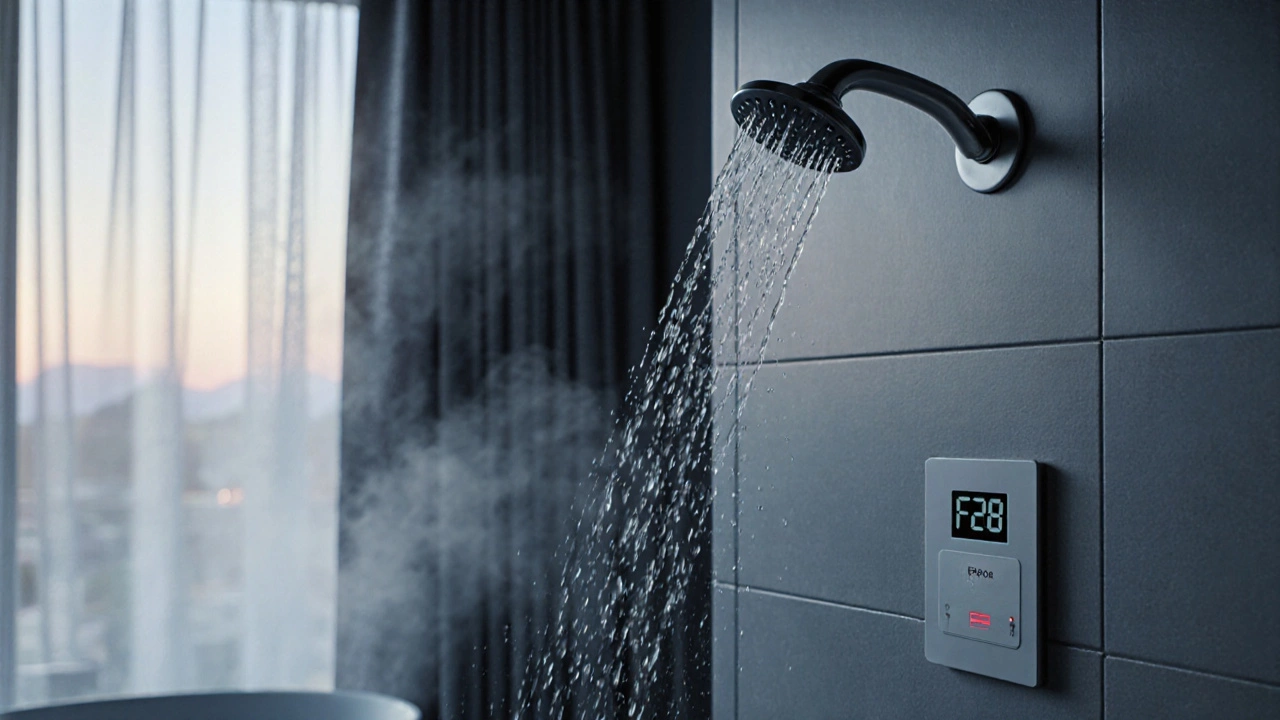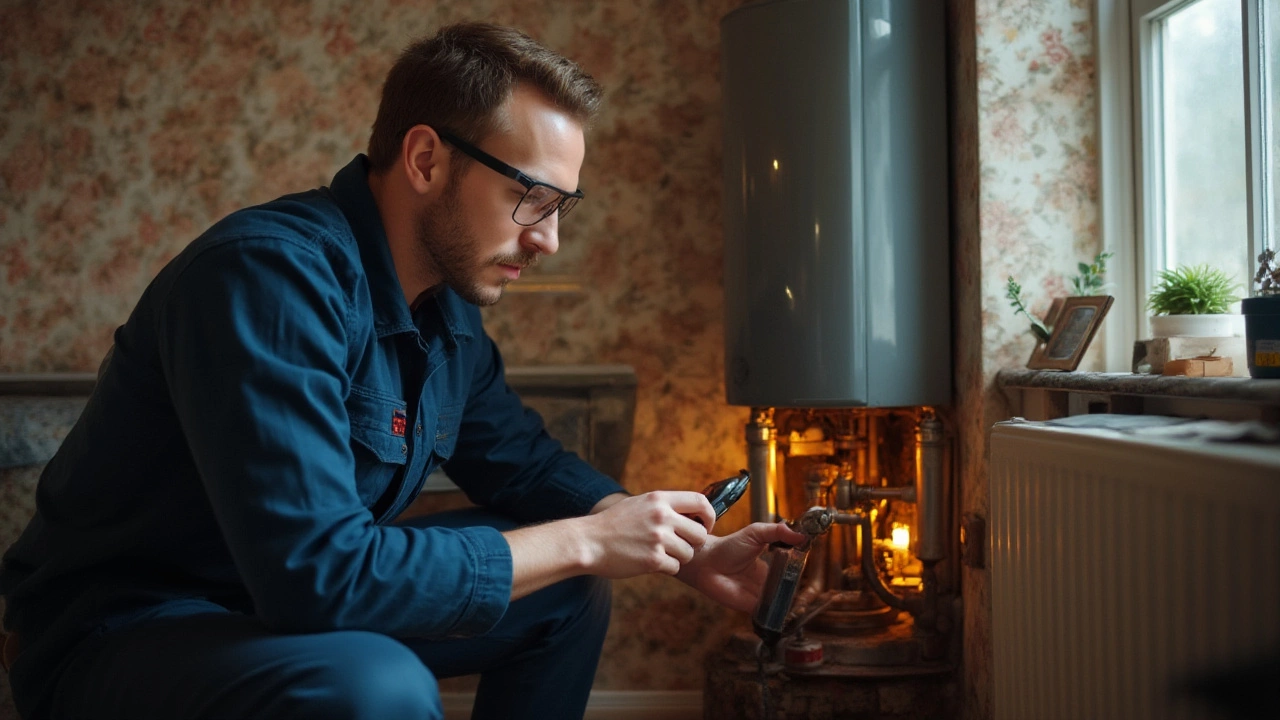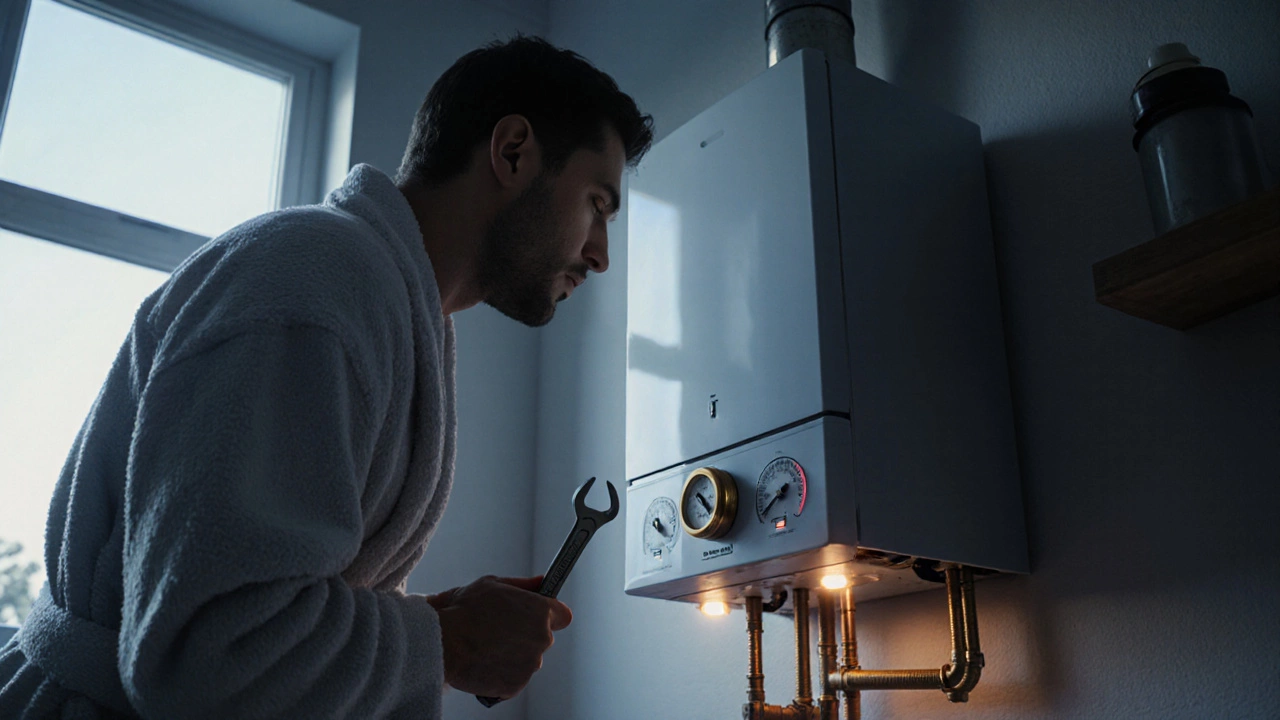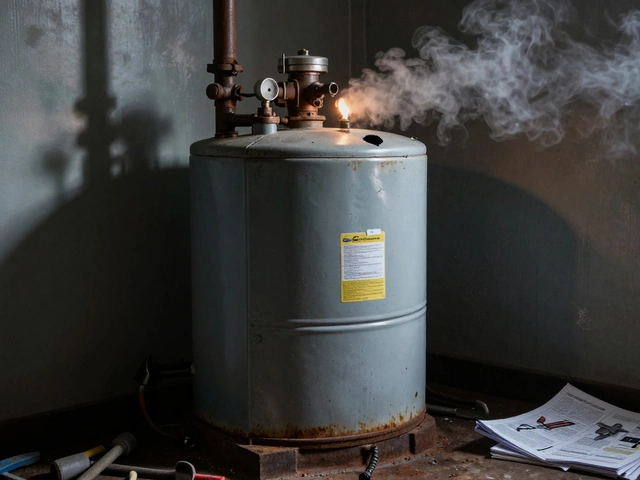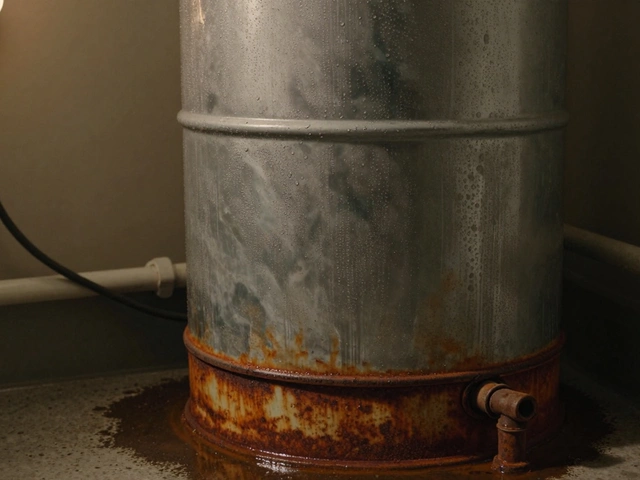Boiler Hot Water Checker
Does Your Boiler Still Provide Hot Water?
This tool helps you determine if you'll have hot water when your boiler is broken based on your system type. Learn the difference between combi boilers and systems with hot water cylinders.
If your boiler breaks down, does that automatically mean you have no hot water? The short answer is: yes - most of the time. But not always. And knowing why, and when it might not be true, can save you hours of panic and unnecessary calls to a plumber.
How a Boiler Actually Makes Hot Water
Most homes in New Zealand that use boilers for heating also use them to heat water. It’s not two separate systems. A standard combi boiler pulls cold water from the mains, heats it instantly using gas or electricity, and sends it straight to your taps or shower. No tank. No waiting. That’s why you get hot water on demand.When the boiler breaks, it’s not just the radiators that go cold - the water stops heating too. The same burner, pump, and heat exchanger that warm your living room are the ones warming your shower. If one part fails, the whole system shuts down.
When a Broken Boiler Means No Hot Water
There are three common reasons your boiler stops making hot water:- Ignition failure: The boiler won’t light. No flame means no heat. You’ll hear clicking but no roar.
- Low water pressure: If pressure drops below 1 bar, safety systems lock the boiler. No pressure = no hot water.
- Faulty heat exchanger: This is the part that transfers heat from the burner to the water. If it cracks or gets blocked, water flows through cold.
In all three cases, you’ll notice the same thing: cold water from the tap, even when you turn the knob all the way. No trick. No workaround. The boiler isn’t working - so the water stays cold.
When a Broken Boiler Might Still Give You Hot Water
There’s one exception: if you have a system boiler or regular boiler with a separate hot water cylinder. These older systems store hot water in a tank, usually in the airing cupboard. The boiler heats the tank once or twice a day. If the boiler breaks after the tank’s already full, you might still have hot water for a few hours - maybe even a full day.But here’s the catch: once that stored water runs out, you’re done. No more showers. No more washing dishes in hot water. And if your boiler is broken, you can’t refill the tank. So yes - it’s temporary. And it’s not a fix.
Some people think a faulty thermostat or a broken radiator valve means the boiler is still making hot water. That’s not true. The boiler still needs to fire up to heat the water. If it’s not running at all, the water won’t get hot - even if the pipes feel warm from residual heat.
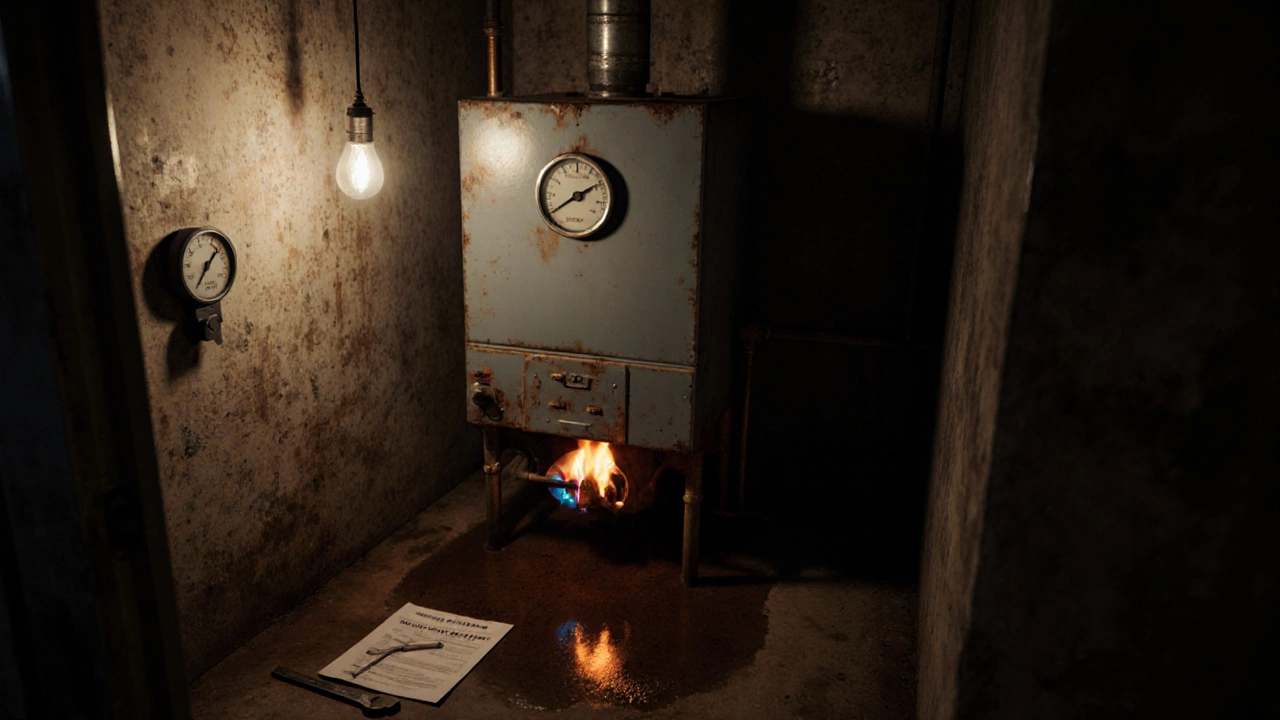
What to Do When Your Boiler Breaks
If you turn on the tap and the water is icy, don’t assume it’s just a power cut or a setting issue. Check these first:- Look at your boiler’s display. Does it show an error code? (F28, F75, E10 - these are common in New Zealand boilers like Vaillant or Worcester Bosch.)
- Check the pressure gauge. If it’s below 1 bar, you may need to repressurise the system.
- Reset the boiler. Hold the reset button for 5 seconds. If it fires up and stays on, you’re good - for now.
- If it won’t restart, or it keeps cutting out, turn it off at the mains. Don’t keep trying.
Don’t waste time trying to fix it yourself if you’re not trained. Gas boilers are dangerous to tamper with. A small gas leak or electrical fault can lead to carbon monoxide poisoning - which is silent, deadly, and common in older Auckland homes.
Signs Your Boiler Is Beyond Repair
Some problems are fixable. Others mean it’s time to replace the whole unit. Here’s what to watch for:- Age: If your boiler is over 15 years old, it’s likely inefficient and prone to failure. New Zealand’s average boiler lifespan is 10-15 years.
- Strange noises: Banging, whistling, or gurgling often mean sludge buildup or air trapped in the system. Left unchecked, this can destroy the heat exchanger.
- Yellow flame: A healthy gas flame is blue. A yellow or orange flame means incomplete combustion - a sign of dangerous carbon monoxide production.
- Water leaks: Puddles under the boiler? That’s not normal. It could be a cracked heat exchanger or corroded pipe.
If you’re seeing two or more of these signs, replacement is usually cheaper than repeated repairs. A new A-rated boiler in New Zealand costs between $3,500 and $6,000 installed. But it’ll cut your energy bills by 20-30% and give you reliable hot water for 15+ years.
What About Electric Water Heaters?
Some homes - especially newer builds in Auckland - use electric storage or instantaneous water heaters instead of gas boilers. These are completely separate systems. If your boiler breaks but you have an electric water heater, your hot water will still work.But if you’re on a gas boiler system and you’re asking this question, you probably don’t have a backup. Most homes with boilers rely on them for everything. No boiler = no hot water.
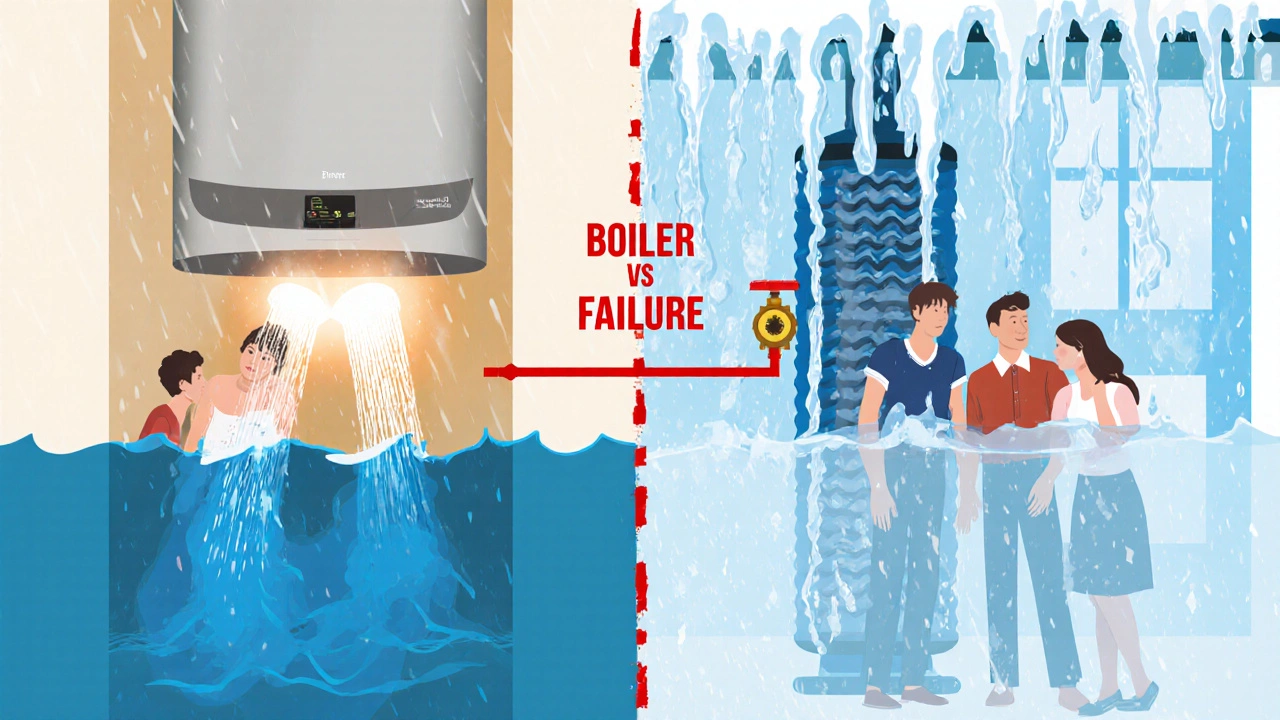
How Long Can You Go Without Hot Water?
It’s not just about comfort. In New Zealand, cold water showers in winter can be dangerous for elderly people or young children. Hypothermia risk increases when water is below 18°C - which is what you’ll get when the boiler fails.If your boiler breaks in May or June, don’t wait until next week to call someone. Most plumbers in Auckland have a 2-5 day wait. But emergency boiler repairs? They’re often done within 24 hours - especially if you’re on a fixed income or have kids.
Some councils offer emergency heating assistance for low-income households. Check with your local council or the Ministry of Social Development. You might qualify for a grant to cover part of the repair or replacement cost.
Preventing Future Breakdowns
The best way to avoid a cold shower in winter is to keep your boiler maintained. Here’s what you should do every year:- Get a gas-safe registered engineer to service your boiler. This is legally required if you’re renting.
- Check the pressure every month. Top it up if it drops below 1 bar.
- Flush the system every 5 years to remove sludge.
- Install a carbon monoxide alarm near the boiler. It’s not expensive, and it could save your life.
Most boiler failures happen because of neglect - not bad luck. A simple annual service can spot a small crack, a weak pump, or a dirty filter before it turns into a full system collapse.
Does a broken boiler always mean no hot water?
Almost always - yes. Most boilers heat both your home and your water using the same system. If the boiler fails, the water stops heating. The only exception is if you have a separate hot water tank that was already full when the boiler broke. But once that water runs out, you’ll have none left.
Can I still have hot water if my boiler is off but the tank is warm?
Only temporarily. If your system uses a hot water cylinder, the water inside might stay warm for a few hours after the boiler turns off. But without the boiler running, it won’t get reheated. Once the stored water cools, you’re out of luck. Don’t rely on this - it’s not a solution.
Why does my boiler keep losing pressure?
Low pressure usually means there’s a leak somewhere - in the pipes, radiators, or inside the boiler. It could be a loose valve, a cracked heat exchanger, or a faulty pressure relief valve. If you’re topping up the pressure every week, you need a professional to find the source. Ignoring it will damage the boiler faster.
Is it safe to use a boiler that makes strange noises?
No. Banging, whistling, or gurgling sounds often mean air in the system, sludge buildup, or a failing pump. These issues can lead to overheating, cracks in the heat exchanger, or even carbon monoxide leaks. Turn the boiler off and call a registered gas engineer immediately.
Should I repair or replace my old boiler?
If your boiler is over 10 years old and needs more than one repair in a year, replacement is usually the smarter choice. New A-rated boilers are 20-30% more efficient, last longer, and come with better warranties. Repeated repairs add up - and you’re still risking a breakdown in the middle of winter.
Next Steps if Your Boiler Is Broken
1. Turn off the boiler at the main switch if it’s cycling on and off or making strange noises. 2. Check for water leaks under the unit. If you see any, shut off the water supply to the boiler. 3. Call a gas-safe registered plumber - don’t use just any handyman. In New Zealand, only certified gas fitters can legally work on boilers. 4. Ask about emergency service. Many companies offer 24/7 boiler repair in Auckland - especially in winter months. 5. Consider a replacement quote. If your boiler is old, ask if they can give you a free quote for a new one. Some companies offer interest-free financing.Don’t wait until you’re shivering in the shower. A broken boiler is urgent - not just because it’s inconvenient, but because it’s a safety risk. Get it checked. Get it fixed. Or get it replaced. Your hot water - and your safety - depend on it.
